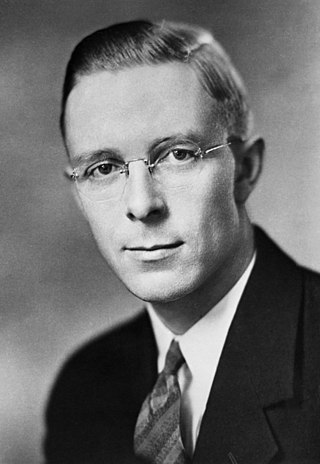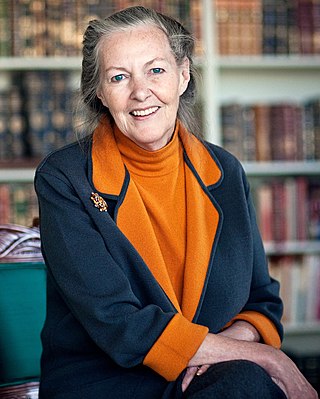
Ralph Philip Klein was a Canadian politician and journalist who served as the 12th premier of Alberta and leader of the Progressive Conservative Association of Alberta from 1992 until his retirement in 2006. Klein also served as the 32nd mayor of Calgary from 1980 to 1989.

Edgar Peter Lougheed was a Canadian lawyer and Progressive Conservative politician who served as the tenth premier of Alberta from 1971 to 1985, presiding over a period of reform and economic growth.

Ernest Preston Manning is a retired Canadian politician. He was the founder and the only leader of the Reform Party of Canada, a Canadian federal political party that evolved into the Canadian Alliance in 2000 which in turn merged with the Progressive Conservative Party to form today's Conservative Party of Canada in 2003. Manning represented the federal constituency of Calgary Southwest in the Canadian House of Commons from 1993 until his retirement in 2002. He served as leader of the Official Opposition from 1997 to 2000.

Donald Ross Getty was a Canadian politician who served as the 11th premier of Alberta between 1985 and 1992. A member of the Progressive Conservatives, he served as Energy Minister and Federal and Intergovernmental Affairs Minister in the government of Peter Lougheed before leaving politics for the private sector in 1979. He returned to politics six years later to enter the Progressive Conservative leadership contest resulting from Lougheed's retirement. He defeated two other candidates, and became Premier November 1, 1985.
The Progressive Conservative Association of Alberta was a provincial centre-right party in the Canadian province of Alberta that existed from 1905 to 2020. The party formed the provincial government, without interruption, from 1971 until the party's defeat in the 2015 provincial election under premiers Peter Lougheed, Don Getty, Ralph Klein, Ed Stelmach, Alison Redford, Dave Hancock and Jim Prentice. At 44 years, this was the longest unbroken run in government at the provincial or federal level in Canadian history.
Lieutenant-general Stanley Charles Waters was Canada's first senator to be appointed to his Senate seat following a non-binding provincial Senate election.
The Reform Party of Alberta is a defunct provincial political party in Alberta, Canada, that was registered with Elections Alberta. Its leader was David Salmon.

The 2004 Alberta Senate nominee election, formally the 3rd Alberta Senate nominee election of Alberta was held on November 22, 2004, to nominate appointments to the Senate of Canada. The Senate nominee election was held in conjunction with the 2004 Alberta general election.

The 1905 Alberta general election was the first general election held in the Province of Alberta, Canada, shortly after the province entered Canadian Confederation on September 1, 1905. The election was held on November 9, 1905, to elect twenty-five members to the 1st Alberta Legislative Assembly.

The 1967 Alberta general election was held on May 23, 1967, to elect members of the Legislative Assembly of Alberta to the 16th Alberta Legislature. The election was called after the 15th Alberta Legislature was prorogued on April 11, 1967, and dissolved on April 14, 1967.

The 1971 Alberta general election was the seventeenth general election held in the Province of Alberta, Canada on August 30, 1971, to elect seventy-five members of the Alberta Legislature to form the 17th Alberta Legislative Assembly.

The Triple-E Senate is a proposed reform of the Canadian Senate, calling for senators to be elected to exercise effective powers in numbers equally representative of each province. This is in contrast to the present arrangement wherein individuals are appointed to the Senate by the Governor General, on the advice of the Prime Minister after which they generally do not interfere with the workings of the Lower House. The number of senators allotted to each province, as set out in the constitution, is neither equal nor proportional.

Elaine Jean McCoy was a Canadian politician from Alberta. She was a member of the Senate of Canada.
The 1998 Alberta Senate nominee election, formally the 2nd Alberta Senate nominee election of Alberta was held on October 19, 1998, to nominate appointments to the Senate of Canada. The Senate nominee election was held in conjunction with Alberta municipal elections under the Local Authorities Election Act.

Lee Richardson is a Canadian businessman and politician. He served as the member of Parliament for the riding of Calgary Southeast from 1988 to 1993 as a member of the Progressive Conservative Party of Canada and for Calgary Centre from 2004 to 2012. He resigned from the House of Commons in 2012 to accept an appointment as principal secretary to the Premier of Alberta.
Ronald D. Ghitter is a Canadian lawyer and politician. He served as a member of the Legislative Assembly of Alberta from August 30, 1971, to March 13, 1979, sitting with the governing Progressive Conservative caucus. Ghitter was appointed to the Senate of Canada on March 25, 1993, where he sat as a senator from Alberta until his retirement on March 31, 2000.
Nicholas William "Nick" Taylor was a geologist, businessman and politician from Alberta, Canada.

Alberta is the only Canadian province to hold elections for nominees to be appointed to the Senate of Canada. These elections are non-binding, as the appointment of senators is solely the responsibility of the Governor General of Canada on the advice of the Prime Minister.

The 2012 Alberta Senate nominee election, formally the 4th Senate nominee election of Alberta, was held to elect three nominees for appointment to the Senate of Canada to represent the province of Alberta. It was to be held in the fall of 2010 but was delayed by then-Premier Ed Stelmach. His successor, Alison Redford, announced that it would, be held in conjunction with the 2012 provincial election before June 1 2012. On March 26 it was announced that it would be held on April 23 2012. The results followed the provincial election closely, with the Progressive Conservatives winning all three positions and the Wildrose Party a close second.
Gladys Taylor was a Canadian writer and publisher.











